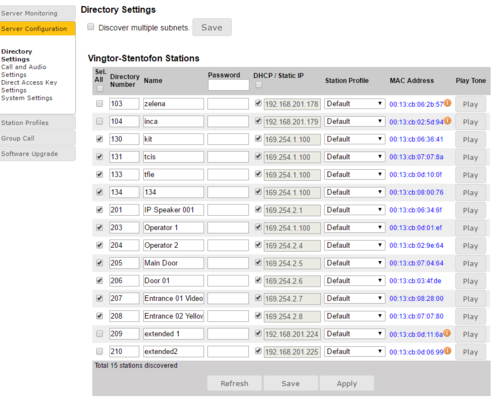Station auto-discovery and Configuration (Pulse)
From Zenitel Wiki
Contents
Station Discovery and Basic configuration
IP Station auto-discovery is a Pulse feature where Pulse server can easily discovery and configure large number of stations. Stations are automatically discovered and by using server's StationWeb configuration pages it is very easy to set up a working Pulse system.
Discovered stations are automatically shown in the stations list. Stations that are configured with some other server will be automatically deselected in the list. Only stations which are selected (checkbox enabled) will receive configured settings, and only those will be saved to Pulse server directory: if we deselect a previously configured station it will be removed from Pulse server directory.
Save will push the configuration to selected stations.
Apply will reboot the selected stations.
Discover Multiple Subnets
As from Turbine firmware 4.7, the Pulse server can discover stations located in different subnets. By default, the Pulse server will only search for IP stations inside its own broadcast domain. If Discover multiple subnets option is enabled, the Pulse server will also search outside the broadcast domain. Note that StationWeb Directory settings is capable of showing up to 64 discovered IP stations. This means that in case of 64+ stations on the network it cannot be predicted which stations will show in the list.

|
To be able to discover stations in multiple subnets, Multicast Routing needs to be enabled in the network. |
IP Station auto-discovery protocol
- When IP Station Discovery service is started all stations including server listen on UDP port 50002 for unicast, broadcast or multicast traffic (in group 239.192.0.199)
- Server uses layer 2 packets for both unicast and broadcast inside its own broadcast domain (local subnet)
- Layer 3 multicast packets are used for discovery and configuration of stations outside server's broadcast domain (local subnet)
Layer 2 packets cannot traverse multiple network segments (routing cannot be done using MAC address), so server needs to use layer 3 multicast packets - Messages that are transferred over multicast have destination station mac address prepended (un-encrypted) to encrypted message so that receiving side knows that it needs to process a message
Multicast discovery messages that should be processed by all stations have destination mac of FF:FF:FF:FF:FF:FF - Clients always respond with both Layer 2 and Layer 3 unicast messages addressed directly to server Layer 2 message will be received by server only inside same broadcast domain (local subnet)
- For discovery in other subnet to work stations must have unique IP address and gateway configured If stations are set with factory static IP address, or with other link-local IP address (i.e. 169.254.x.y), it will not be possible to respond to discovery message
- Clients use delay algorithm when answering to server Delay is used to avoid congestion on server side in case when large number of stations are discovered and configured All stations should respond to server discovery message in no longer than 5 seconds. Up to 64 discovered stations should have configuration applied from server in less than 10 seconds.
Basic configuration
Vingtor-Stentofon Stations
Only stations which are selected (checkbox enabled) will receive configured settings, and only them will be updated/added to client list on Pulse server.
The following limitations are enforced on configuration parameters.
| Parameter | Limitation |
|---|---|
| Directory Number | Must be a number, max 10 digits |
| Name | max 60 characters, some special characters are forbidden - <,>,?, {,},[,],@ |
| Password | max 20 characters, some special characters are forbidden - <,>,?,{,},[,],@ |
| Static IP | IP address must be in correct format |
Offline stations
....
Third Party SIP Terminals
...
VS-Client
...
Gateways
...
Pulse Trunk
]]

